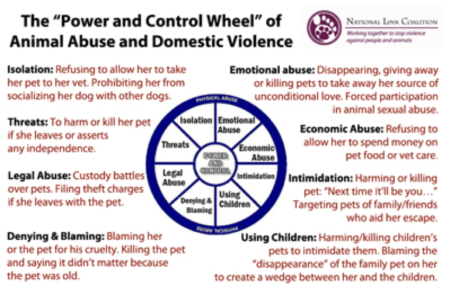Part IV: Breaking the Cycle

UNDERSTANDING THE CONNECTION BETWEEN VIOLENCE TOWARDS ANIMALS AND VIOLENCE TOWARDS PEOPLE
This guest blog was written originally for the SPCA of Texas by Marlo Clingman.
It is part of a series; Part I can be found here. Part II can be found here. Part III can be found here.
WARNING: In this series of posts, the SPCA of Texas addresses some deeply serious issues surrounding the connection between violence towards animals and violence towards people. Some of the graphic information below may be disturbing to some readers.
Shalen Gardner was well-known to Fort Worth police when they arrested him on suspicion of murder.
In 2011, Gardner had killed the family dog with a hammer, just five months after he threatened a family member with a knife. In both cases, he only received a sentence of two years probationary deferred adjudication. After violating his parole multiple times, he was jailed for just six month on each charge.
Gardner continued to violate his parole, yet he the consequences he faced in each instance were slaps on the wrist. Caught numerous times with possession of a firearm and illegal drugs, a judge eventually sentenced him to 3 months in a substance abuse facility.
In 2017, two months after he was released from the facility, he murdered his estranged wife while their children slept in the next room.
Gardner’s sentence for killing his family’s pet was not commensurate with the crime he committed. Since Gardner killed his dog, Texas’ anti-animal cruelty laws have thankfully been strengthened thanks to hard work by many dedicated groups and individuals. But, over and over again the justice system was unable to legally connect that Gardner’s capacity for murder was already documented with the death of his dog.
When animals are abused, people are at risk; when people are abused, animals are at risk.
The LINK goes in both directions. While violent actions against animals can indicate future violence against people, domestic abuse can also mean potential danger for animals in the home. According to the ASPCA, “As many as 25% of domestic violence survivors have reported returning to an abusive partner out of concern for their pet. And that fear is often justified. Studies demonstrate that abusers intentionally target pets to exert control over their intimate partners—71% of pet-owning women entering domestic violence shelters report that their abuser threatened, harmed, or killed a family pet.”

*Source: National LINK Coalition
As a society, we must do better to protect people and pets in abusive situations. Some of the ways we can make north Texas a safer place for humans and animals alike include:
Keep guns out of the hands of abusers.
The rate of homicide within an abusive home increases by 500% when the abuser possesses a firearm. Enforcement of current gun laws that require domestic abusers subject to protective orders to surrender their guns to law enforcement has been underwhelming.
Make it safer and easier for victims to leave their abusers.
This includes addressing intersecting factors such as race, religion, geographic location, mental health and immigration status. Many victims may find it difficult to trust advocates outside of their community. This is why training community leaders in the LINK is so important to ensuring a smooth transition for domestic violence survivors.
Improve and broaden the resources for survivors after they leave their abusers.
According to the National Network to End Domestic Violence, domestic violence is a leading cause of homelessness for women and children. Domestic violence victims need access to affordable housing that will be safe for both them and their pets.
Speak up loudly and keep the pressure on our representatives to pass laws protecting survivors and their pets.
One of the most important pieces of legislation at the national level is the Pet and Women Safety Act (PAWS). This bipartisan bill would: broaden the definition of stalking to include causing fear of harm to an individual’s pet; urges states to include pets in protection orders; specifies criminal penalties for violations of pet protection orders; and mandatory restitution for the full amount of the victim’s financial losses including veterinary care for their pet.
To learn more about the LINK, please visit the North Texas LINK Coalition website. To learn about how to lobby your local representatives to pass humane legislation, visit Texas Humane Legislation Network.
About the SPCA of Texas
The SPCA of Texas is the leading animal welfare organization in North Texas. Founded in 1938, the non-profit operates two shelters, three spay/neuter clinics, two mobile spay/neuter vehicles, one mobile adoptions vehicle and an animal rescue center, all located in Dallas and Collin Counties, and maintains a team of animal cruelty investigators who respond to thousands of calls in seven North Texas counties. Moreover, the SPCA of Texas serves as an active resource center for an array of services that bring people and animals together to enrich each other’s lives. The SPCA of Texas is not affiliated with any other entity and does not receive general operating funds from the City of Dallas, State of Texas, federal government or any other national humane organization. The SPCA of Texas is dedicated to providing every animal exceptional care and a loving home. To learn more about the SPCA of Texas, visit www.spca.org. DONATE WITH CONFIDENCE – Tax ID: 75-1216660
